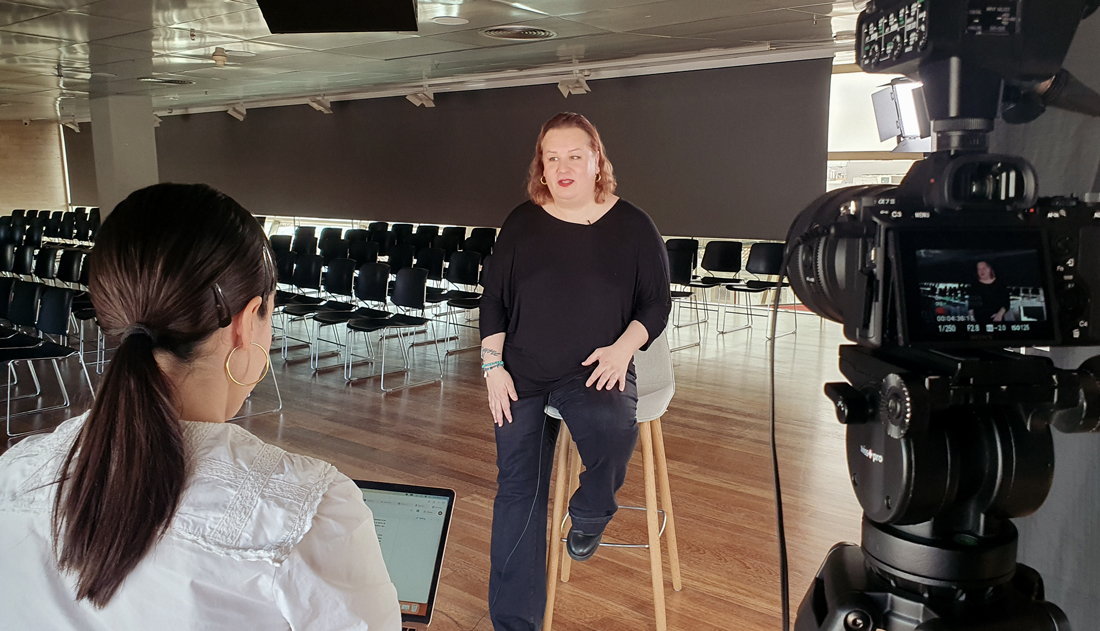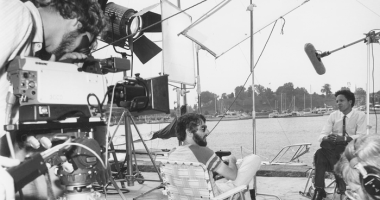ARVE Error: src mismatch
url: https://youtu.be/OJ8xfshJNpk
src in: https://www.youtube-nocookie.com/embed/OJ8xfshJNpk?feature=oembed&enablejsapi=1&origin=https://lab.cccb.org
src gen: https://www.youtube-nocookie.com/embed/OJ8xfshJNpkActual comparison
url: https://youtu.be/OJ8xfshJNpk
src in: https://www.youtube-nocookie.com/embed/OJ8xfshJNpk?enablejsapi=1&origin=https%3A%2F%2Flab.cccb.org
src gen: https://www.youtube-nocookie.com/embed/OJ8xfshJNpk
After the success of her first novel, the writer Alana Portero says she feels herself to be in a privileged position. But the road has not been easy: Bad Habit comes after years of work done between care, poems and media columns. Between fiction and activism – this is the habitat that has shaped this writer from Madrid.
The Madrid-born writer Alana Portero explains that when she began thinking about Bad Habit (Harpervia, 2024) she imagined that this first novel would be about childhood. But as it started to take shape, the book asked to her to make it into something more, turning out in the end to be a novel that narrates the journey of a working-class girl as she grows up. There is, however, no single protagonist, as the main character can only be understood in the context of the social, historical and political milieu that plays out around her and shapes both personal and community identities. It takes us to the 1980s, to the neighbourhood of San Blas, in the east of Madrid. Alongside the narrator there parades a series of characters (essentially female and quirky), settings and episodes, in a game of balance between beauty, anger and dignity. In Bad Habit there is no impasse or clash between the working class and trans worlds, between the question of whether we used to live better than we do now, because it is an exercise in directly exposing, in displaying the collective reality that affects all the female characters equally, and where the material need that runs through all of them – the impulse towards a dignified life, towards a better life – is expressed at the same time as rage and tenderness, friendship and contempt, resentment and love.
“Bad Habit was written on the back of strokes of inspiration, memories and notes that I gathered together over four, almost five years,” explains Portero, in a talk held the morning after she took part in the Kosmopolis literature festival at the CCCB in Barcelona. “I was writing small fragments, setting out the structure in my head, until 2022, when I was able to stop. I’d thought about it so much, and I’d accumulated so much material, that I had a very clear of what the novel would be.” So much so that the book was written in the space of a month. “Two hundred and ninety-eight hours of intense work,” adds the writer, who counted every minute she spent on it so that she could feel she was making progress, “in the same way that I counted the words I was writing, it reassured me somehow.”

This method of literary construction, in which the story emerges little by little, like a climb up to the right spot, can also be said to apply to her literary career. “Bad Habit is a bit like the final phase of my years writing poetry, columns and contributions to anthologies. For me, this book marks a before and after, it’s a publication that has nothing to do with what came before in terms of media and personal impact.” Examples to illustrate this success abound: before its publication in Spanish, it was the most talked-about novel at the Frankfurt Book Fair, the rights have been sold for the translation of the book into eleven languages, and as a result, the writer is currently halfway through a tour of Europe and Latin America. Bad Habit has risen to the top of the bestseller lists and features frequently in both conventional literary reviews and in those published on social media.
The novel’s standing could also be measured by the discussions that have taken place since its publication – the women who appear in these pages have managed to open up their own topics of conversation. “The trans women in Bad Habit, who are also sex workers, are a very clear homage to the most abused women in our recent history.” While they were once shunned wherever they went, especially due to Spain’s so-called Law on Social Danger and Rehabilitation (in force until 1995), giving them a space in fiction is a way to dignify them. “Those who survive are pure lessons in life and feminism. It seems to me that the history of our culture is not complete without them, and I wanted to stop focusing on columns and articles and work them into a novel, which is how we learn things. I think they deserve to be seen as more than just comic relief or fetish.” The film director Pedro Almodóvar also took note of them, suggesting to the President of the Spanish Government in an article that he should read Alana Portero’s book, “so that he can get an idea of how much suffering, how much pain, how much risk there is when you are born in the wrong body.”
In the medium-term, all these numbers, anecdotes and achieved goals have given Portero peace of mind, “knowing that I can write calmly in a reasonable amount of time, and that it’s possible to have a career. This was something that I was unable to achieve, or that I thought was out of my grasp – having a literary career is a privilege.” But our heroine’s journey has not been as simple as it seems – just like for the novel’s protagonist, it doesn’t fit into the typical tale of self-improvement. “Expectations are something that, initially, weigh you down a lot. I suffered because of them before the book was published,” the writer says about what it was like to experience first-hand all the media buzz before and during the publication of Bad Habit. “It seems to me that there was an enormous amount of media coverage, a huge amount of attention, and this made me feel really insecure. Because the one thing I’m insecure about is my work, and I always will be, no matter how much effort I put into it and no matter how much I defend it – one thing doesn’t cancel the other.”
Although she admits that she had a terrible time a few months ago, she can now face writing her next novel more calmly: “What I did was to start right away, I started writing my second novel the day I presented Bad Habit here in Barcelona. That same night, when I got back to the hotel. I spoke to Alba Carballal, who’s a colleague at Seix Barral and a wonderful writer, and she gave me a piece of advice that she got from Eduardo Mendoza: get the second novel out of you as soon as you can.”
In the meantime, Alana Portero says that she always has time to read, because that’s the only way she can go on. “When I was writing Bad Habit I had Fires by Marguerite Yourcenar next to me all the time, which is one of my three favourite books in the world. I would also say that she’s my favourite writer, because of that balance she has between philosophy, mythology and literature. I also read Behind the Curtains by Carmen Martín Gaite, I think it’s one of the most intelligent novels you can read in this life. The observation from behind the curtains that sets the novel going was very useful to me as a point of view from which to see the world from outside. And finally, The Man Who Fell in Love with the Moon [by Tom Spanbauer], which is another of my favourite novels and narrates the tension of gender very well.”




Leave a comment